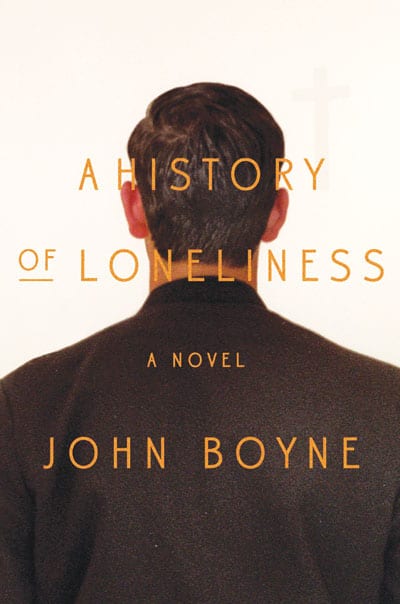John Boyne’s follow-up to ‘The Absolutist’ is another amazing novel
 A History of Loneliness by John Boyne (Farrar, Straus and Giroux 2015; $26). 352 pp.
A History of Loneliness by John Boyne (Farrar, Straus and Giroux 2015; $26). 352 pp.
Once Odran Yates’ mother informed him that he had “a vocation,” Odran never questioned that he would become a priest. As a 16-year-old, Odran went to seminary in his native Ireland, where he roomed with Tom Cardle, the boy he considered his best friend.
While Odran was certain that he was perfectly suited for the priesthood, Tom was another matter. Tom tried to leave seminary only the have his father bring him back — black and blue. Odran wondered if that was why Tom was prone to fits of strangeness.
Though they eventually lost contact, Odran heard rumors that his friend was moved from parish to parish. That seemed odd, and was upsetting when the archbishop wanted Odran to leave his beloved position as librarian at a boys’ college to take over in Tom’s latest move. “I didn’t know what to think … But there’s the lie,” Odran said. “I did know what to think. Only I could not bring myself to think it.”
Respectfully outraged, timely, scandalous and loaded with more than a little controversy, A History of Loneliness shimmers like a multifaceted diamond. Indeed, I barely know where to start in my praise. John Boyne (The Absolutist) paints Odran as a simple man, the clueless, go-along-to-get-along type who likes to think of himself as responsible and intuitive. He’s likeable but not really friendship material; he’s predictable, gossipy and staid except on the occasions when he doubts his faith and his vows. That’s when he surprises himself, as well as us. But Boyne doesn’t stop there. In a setting of modern-day Ireland and Rome, Boyne populates this tale with close-lipped, complicated people; gives it dialogue rich with Irish brogue; and hands his readers plenty of exceptional back-plots.
That adds up to a stunner of a novel that feels like reading a movie, one that needs to jump to the top of your to-read list. But clear your calendar — once you start A History of Loneliness, you don’t have a prayer.
 Soldier of Change: From the Closet to the Forefront of the Gay Rights Movement by Stephen Snyder-Hill, foreword by George Takei (Potomac Books 2014; $22.95). 198 pp.
Soldier of Change: From the Closet to the Forefront of the Gay Rights Movement by Stephen Snyder-Hill, foreword by George Takei (Potomac Books 2014; $22.95). 198 pp.
Stephen Snyder-Hill says he’d always felt “this darkness I couldn’t understand.” His mother also noticed it, but he couldn’t explain to her that he loathed himself. “When people say that being gay is a choice,” he says, “I always remember trying to unchoose it.”
Coming from a long line of soldiers, he enlisted in the military, first stationed in Germany, then Iraq. That was where he decided that he was “going to finally start living my life for myself.” But serving during “Don’t ask, don’t tell” meant he had to keep quiet about his sexuality. He endured indirect taunts from fellow soldiers and he learned to hide his love of (and marriage to) another man. Finally, fed up and coincidentally presented with a chance to ask a question of the 2012 Republican candidates in a national debate, he crafted a query he thought might change things.
Reading this book is like having a beer with a buddy. It’s chatty rather than stuffy, yet Snyder-Hill’s outrage comes through loud and clear as he takes his story further, writing about life as a gay man during DADT days, his activism and the work he’s done on behalf of gay and lesbian soldiers. This book is genuine, and I liked that, too. It’s also one to enjoy if you want an informal, easy-to-like memoir. Even in this post-DADT time, Soldier of Change is a book to call for.
— Terri Schlichenmeyer
This article appeared in the Dallas Voice print edition February 20, 2015.

